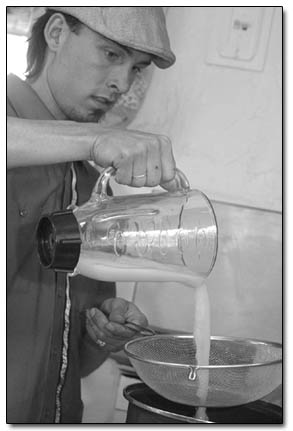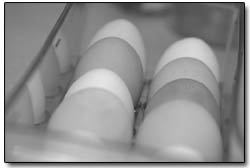 |
Nathan Ballenger, founder
of New Year’s Revolution, a local group that seeks
to minimize the use of pre-packaged foods by placing an
emphasis on locally
produced food, pours a homemade batch of rice milk through
a strainer at his house recently./ Photo by Todd Newcomer.. |
Nathan Ballenger has big plans
for the future of food in Durango. Along with 70 other local
residents, he has formed the “New Year’s Revolution,”
and what began as a push to avoid buying packaged foods has
become a year-round effort to grow, consume and encourage local
foods.
Last January, Ballenger and his wife, Rachel Cooper, picked
up a copy of Adbusters magazine and read an article encouraging
people to try going without packaging by getting their sustenance
from the source.
“Packaging makes up a very high percentage of our food
and beverage consumption, and there are major issues with deforestation,
landfills, and air, water and aesthetic pollution associated
with it,” Ballenger said. “From there, we got into
a conversation on a community initiative for going without packaged
products.”
However, Ballenger and Cooper also were realistic. “We
immediately realized that our group would be very small if we
tried to get people to completely go without packaging.”
Instead, Ballenger adjusted the focus, and the “New Year’s
Revolution” became centered on encouraging local food
production and consumption. “If you can get it locally,
you can most likely get it nonpackaged,” Ballenger said.
“Since we’ve started this, it’s developed
into an annual focus on local foods.”
The focus begins with a seed exchange within the group in late
April. The seeds are planted, and as they mature, the Durango
Farmer’s Market comes into play as a means of spreading
the produce. Following the fall harvest, Ballenger has plans
for an “Apple Jam,” a festival including music but
centering around turning produce into juices, jams and other
foods. Following the “Apple Jam,” the focus shifts
to stocking up a root cellar and dehydrating foods. When this
food runs out in January, the actual “New Year’s
Revolution” begins. Every two weeks, between Jan. 22 and
April 22, the group will meet for a potluck. Although there
is a focus on nonpackaged foods, everyone is welcome regardless
of habits. After the passage of winter, the seed exchange takes
place, the potlucks end and the cycle begins anew.
“Generally, we’re asking, ‘How can we be
more local, and how can we be self-sufficient and have a sustainable
community?’” Ballenger said.
 |
| A tray of locally harvested eggs sits
in Nathan Ballenger’s refrigerator. Ballenger and
others are trying to encourage locally produced food in
an effort to cut down on waste./ Photo by Todd Newcomer. |
The vision of the New Year’s Revolution is an all-inclusive
one, and Ballenger said the group’s aim is not to hold
people to unrealistic, high standards. “We’re not
here to handcuff ourselves to a rule,” he said. “Everyone
is welcome regardless of what they choose to do. I still buy
packaged products. The idea is to see how far we can go and
still be healthy and considerate of our time.”
By most standards, Ballenger has gone pretty far. He’s
started making his own butter and cheese from local cow and
goat’s milk. He makes his own rice milk, dog food and
tooth paste, among other things. And Ballenger said he would
like to do more, but that food production is time consuming.
“There’s a lot more time involved,” he said.
“I found myself spending weekends making food. But there’s
definitely also a big cost reduction.”
Since the “New Year’s Revolution” began this
January, 70 Durango residents have gotten on board to varying
degrees and in various capacities. The group has also connected
with and started forming partnerships with Durango Natural Foods
and Sunnyside Farms to purchase non-packaged food and would
like to work with local restaurants. Several connected efforts
have also spun off of the group, including a seed exchange group
trying to establish a Durango seed bank, a biodiesel coalition
which intends to convert fryer grease into fuel locally and
a group that is ambitiously working toward setting up a local
currency.
Still, Ballenger’s view of the project is more sweeping.
With time, he would like to see it spread well beyond 70 people
and become relevant throughout Durango and La Plata County.
In particular, he would like local farmers and ranchers to become
the backbone of the revolution.
“This year, it has been very much word of mouth, and
we’ve had 70 people involved at one point or another,”
Ballenger said. “Next year, we’d like to get more
of the agricultural community involved. We think farmers and
ranchers should be involved with and inspired by a group of
people who support locally produced foods.”
Ambitions aside, the group is not in a rush and understands
that the movement may take many years to get established. “We
didn’t want to take off at 100 mph. We hope that as an
annual event it will organically grow over the years.”
In January, the first potluck was held at recent City Council
candidate Michael Rendon’s home, and he has been active
with the “New Year’s Revolution” since. Rendon
said that the amount of local involvement has been strong largely
because positive momentum for local foods has been building
in Durango for years. “Local agriculture is supported
very strongly here,” he said. “Watching the Farmer’s
Market grow here over the last few years has been great. The
push is on.”
| For more information
on New Year's Revolution, contact Nathan Ballenger at 385-3703. |
Like Ballenger, Rendon has taken steps away from standard consumerism.
“I’ve always tried to buy local foods and bulk and
use my own containers,” Rendon said. “But now I’m
going further. I’m totally off Celestial Seasonings now
and making my own tea. I have cow and goat’s milk delivered
every week. I also make my own toothpaste.”
Still, Rendon also admits to straying frequently. “I’m
not a saint. I still go out and buy a pint of Ben & Jerry’s
every now and then and plenty of other packaged foods.”
Ballenger echoed this sentiment, stressing that the “New
Year’s Revolution” is not about creating an exclusive
group and preaching to the rest of the community. Rather, the
New Year’s Revolution is a push to get the entire community
interested and passionate about local foods and create change
from the bottom up.
“The New Year’s Revolution is not a quick fix to
anything,” Ballenger said. “It’s going to
be an annual process that will grow bigger and bigger. With
time, we’ll figure out the way to better organize and
advance the idea.”

